Shaull Almagor
Introducing Delays in Multi-Agent Path Finding
Jul 20, 2023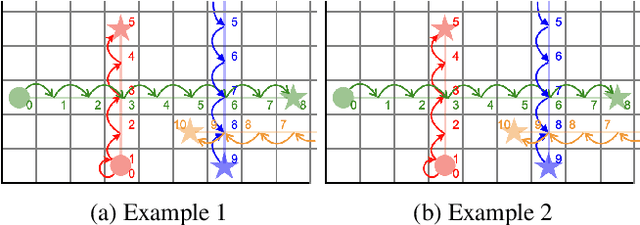
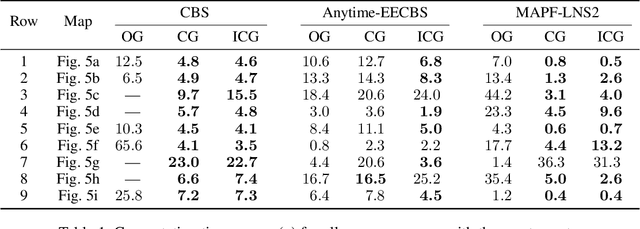


Abstract:We consider a Multi-Agent Path Finding (MAPF) setting where agents have been assigned a plan, but during its execution some agents are delayed. Instead of replanning from scratch when such a delay occurs, we propose delay introduction, whereby we delay some additional agents so that the remainder of the plan can be executed safely. We show that the corresponding decision problem is NP-Complete in general. However, in practice we can find optimal delay-introductions using CBS for very large numbers of agents, and both planning time and the resulting length of the plan are comparable, and sometimes outperform, the state-of-the-art heuristics for replanning. We also examine the benefits of our method from an explainability point of view.
Conflict-based Search for Multi-Robot Motion Planning with Kinodynamic Constraints
Jul 01, 2022


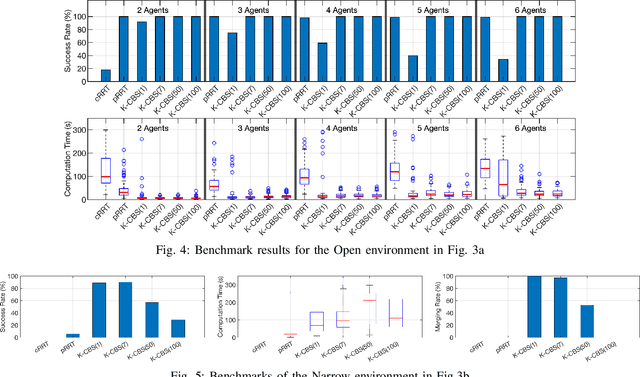
Abstract:Multi-robot motion planning (MRMP) is the fundamental problem of finding non-colliding trajectories for multiple robots acting in an environment, under kinodynamic constraints. Due to its complexity, existing algorithms either utilize simplifying assumptions or are incomplete. This work introduces kinodynamic conflict-based search (K-CBS), a decentralized (decoupled) MRMP algorithm that is general, scalable, and probabilistically complete. The algorithm takes inspiration from successful solutions to the discrete analogue of MRMP over finite graphs, known as multi-agent path finding (MAPF). Specifically, we adapt ideas from conflict-based search (CBS) - a popular decentralized MAPF algorithm - to the MRMP setting. The novelty in this adaptation is that we work directly in the continuous domain, without the need for discretization. In particular, the kinodynamic constraints are treated natively. K-CBS plans for each robot individually using a low-level planner and and grows a conflict tree to resolve collisions between robots by defining constraints for individual robots. The low-level planner can be any sampling-based, tree-search algorithm for kinodynamic robots, thus lifting existing planners for single robots to the multi-robot settings. We show that K-CBS inherits the (probabilistic) completeness of the low-level planner. We illustrate the generality and performance of K-CBS in several case studies and benchmarks.
Conflict-Based Search for Explainable Multi-Agent Path Finding
Feb 20, 2022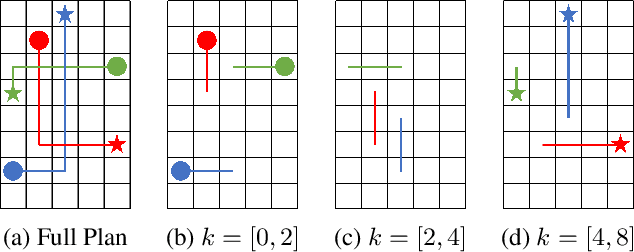
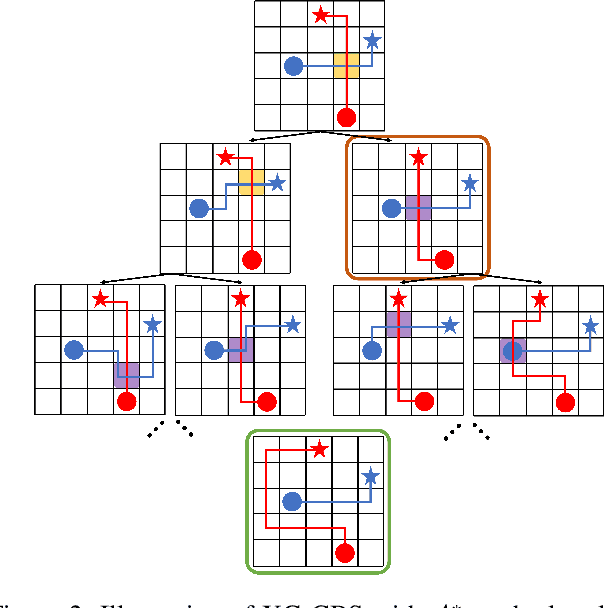

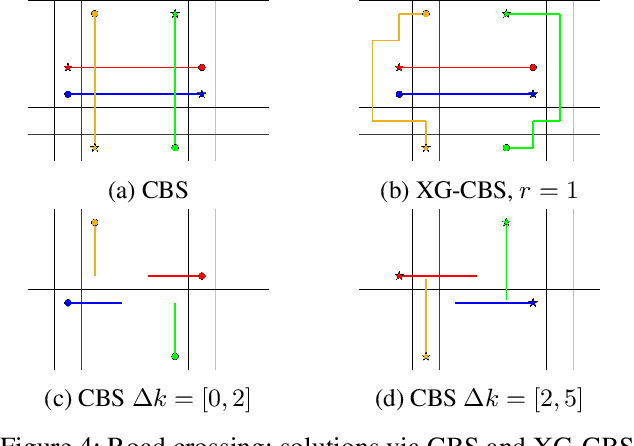
Abstract:In the Multi-Agent Path Finding (MAPF) problem, the goal is to find non-colliding paths for agents in an environment, such that each agent reaches its goal from its initial location. In safety-critical applications, a human supervisor may want to verify that the plan is indeed collision-free. To this end, a recent work introduces a notion of explainability for MAPF based on a visualization of the plan as a short sequence of images representing time segments, where in each time segment the trajectories of the agents are disjoint. Then, the explainable MAPF problem asks for a set of non-colliding paths that admits a short-enough explanation. Explainable MAPF adds a new difficulty to MAPF, in that it is NP-hard with respect to the size of the environment, and not just the number of agents. Thus, traditional MAPF algorithms are not equipped to directly handle explainable-MAPF. In this work, we adapt Conflict Based Search (CBS), a well-studied algorithm for MAPF, to handle explainable MAPF. We show how to add explainability constraints on top of the standard CBS tree and its underlying A* search. We examine the usefulness of this approach and, in particular, the tradeoff between planning time and explainability.
MAPS-X: Explainable Multi-Robot Motion Planning via Segmentation
Nov 02, 2020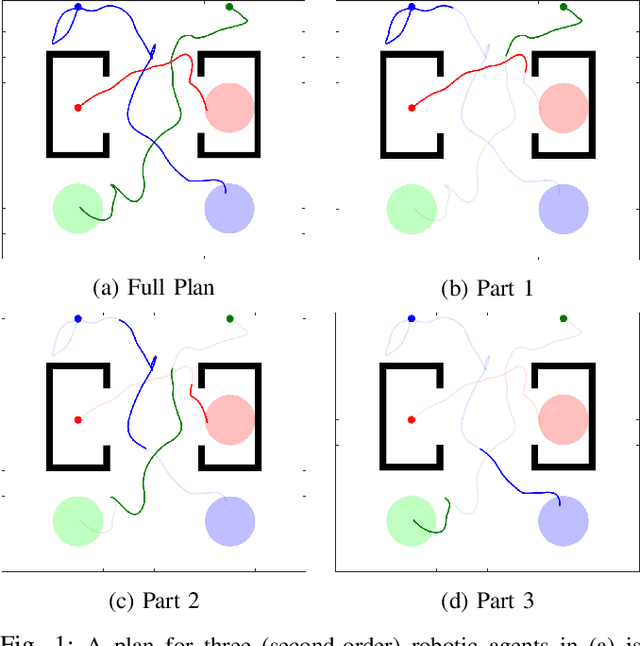
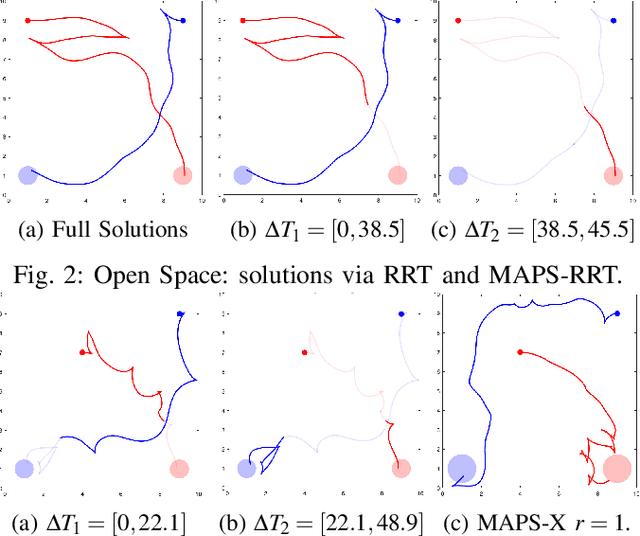
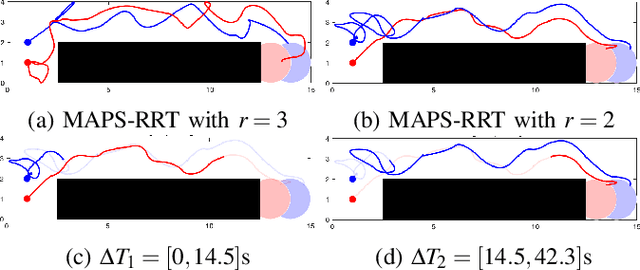
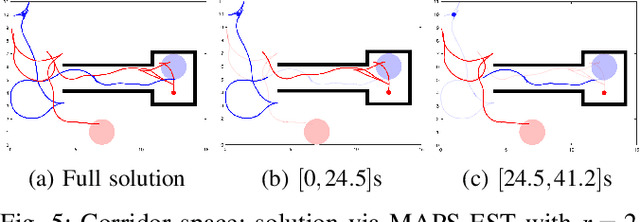
Abstract:Traditional \textit{multi-robot motion planning} (MMP) focuses on computing trajectories for multiple robots acting in an environment, such that the robots do not collide when the trajectories are taken simultaneously. In \emph{safety-critical} applications, a human supervisor may want to verify that the plan is indeed collision-free. In this work, we propose a notion of explanation for a plan of MMP, based on visualization of the plan as a short sequence of images representing time segments, where in each time segment the trajectories of the agents are disjoint, clearly illustrating the safety of the plan. We show that standard notions of optimality (e.g., makespan) may create conflict with short explanations. Thus, we propose meta-algorithms, namely \emph{multi-agent plan segmenting}-X (MAPS-X) and its lazy variant, that can be plugged on existing centralized sampling-based tree planners X to produce plans with good explanations using a desirable number of images. We demonstrate the efficacy of this explanation-planning scheme and extensively evaluate the performance of MAPS-X
 Add to Chrome
Add to Chrome Add to Firefox
Add to Firefox Add to Edge
Add to Edge